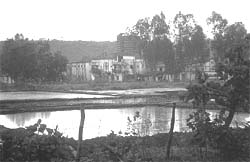Distilled waste
 using a chemical catalyst and energy from the Sun, scientists in Maharashtra have developed a technique to treat foul-smelling distillery wastes. Tests on a small laboratory-type reactor showed that the method can be used to detoxify 100 litres of diluted distillery wastewater in five days. Results of the project at Nimbkar Agriculture Research Institute ( nari ) at Phaltan, Maharashtra, have been submitted to the ministry of non-conventional energy sources.
using a chemical catalyst and energy from the Sun, scientists in Maharashtra have developed a technique to treat foul-smelling distillery wastes. Tests on a small laboratory-type reactor showed that the method can be used to detoxify 100 litres of diluted distillery wastewater in five days. Results of the project at Nimbkar Agriculture Research Institute ( nari ) at Phaltan, Maharashtra, have been submitted to the ministry of non-conventional energy sources.
According to nari director A K Rajvanshi, the scientists, who have applied for a patent on the catalyst, are now trying to improve the technique to cut down the time by three days.
Distillery wastes, especially those originating from cane molasses-based industries, are among the worst pollutants. Almost black in colour, they have high amounts of dissolved solids and a pungent smell ( PTI Science Service , August 16-31, 1999).
The scientists took the cue from work on solar detoxification of groundwater and industrial wastes using titanium dioxide as a catalyst. This method, however, did not give the desired results with distillery wastes and the team used another chemical, which they declined to reveal.
The scientists adjusted various parameters such as dilution of the effluent to ensure adequate penetration of sunlight; the chemical concentration to ensure maximum detoxification without increase in cost of treatment; and temperature and alkalinity of the effluent.
In the reactor designed by the institute, the colour and chemical oxygen demand ( cod ) declined in five days when the effluent was diluted 15 times and treated for eight hours daily at a flow of 100 litres per hour.
The cod dropped from 2,500 milligrammes per litre (mg/l) to 100 mgl, and colour transmittance (which indicates how clear the liquid is) was 90-95 per cent at 500 nanometre wavelength.
The chemical A was recycled by allowing the treated effluent mixture to settle in a container and then draining the water, while the slurry was Sun-dried.
Related Content
- Actions on air quality in North America: Canadian and U.S. policies and programmes to reduce air pollution
- Report filed on the incident of fire at the factory of Shakti Bio Science, Valsad, Gujarat, 26/08/2020
- Bioethanol production from agro wastes by acid hydrolysis and fermentation process
- Show-cause notices to Merck, Sesa Goa
- New biofuel? Orange peel turned into oil
- Blore rural, urban areas have high levels of nitrate, fluoride
